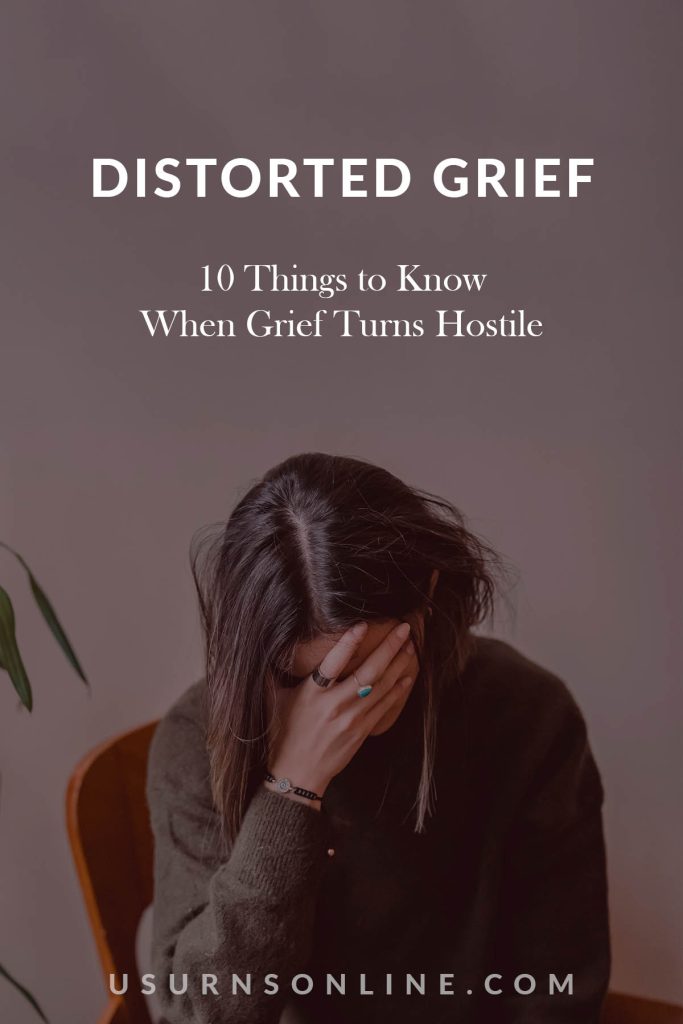Grief hits hard. Really hard. So much so that emotional distortions can happen. This is known as distorted grief.
Maybe you’ve noticed yourself acting differently. Are anger and irritability right at the surface, just ready to boil over? Feelings of guilt and hostility may take over at any given moment.
Notions of self-destruction, suicide, or hurting others may come to mind. If you see yourself described here, please seek professional help.
It sounds like you may be suffering from distorted grief.
What is Distorted Grief?
Distorted grief is a form of complicated grief. It will manifest by showing extreme behavioral changes in yourself. You may experience intense feelings of guilt, anger, hostility towards people, and self-destructive behaviors.
The grief process acts as a stressor and will affect every aspect of your life. The way we grieve can influence people around us and our relationships.
Professionals consider this type of grief to be very unhealthy.

How is distorted grief different from other types of grief?
Unfortunately, there are at least 16 types of grief. Not everyone will suffer from the more worrisome forms. But if you find that you are, there is help for you.
What makes distorted grief different is that will hang on, making you more miserable, suffering mood swings and self-destructive thoughts.
Distorted Grief vs. Normal Grief
Normal grief consists of working through your grieving period without more issues coming to the surface. Typically you will start feeling better in a few months.
With normal grief, you will still likely experience anger, irritability, depression, and other emotions – and often very intensely. But it will subside over time.
Distorted Grief vs. Complicated Grief
Complicated grief is grieving that falls outside the realm of normal grief. It takes longer to reach a breakthrough in the grieving process.
Chronic, delayed, and, yes, distorted grief all fall under the category of complicated grief. So complicated grief is broader, while distorted grief is a specific type.
Distorted Grief vs. Exaggerated Grief
Exaggerated grief happens when your reactions are excessive and extreme. It is normal grief intensified. You may suffer from nightmares, abnormal fears, and even the emergence of underlying psychiatric issues.
So the difference is that distorted grief involves some level of change in your personality, while exaggerated grief is an acute version of normal or ‘typical’ grief.
What are some common causes of distorted grief?
- Dwelling on the death of your loved one.
- Underlying mental or psychiatric issues.
- The sudden or violent death of your loved one.
- The loss of a child.
- Ambivalent feelings toward the person who died.
These are just a few reasons why some people going through the journey of grief may breakdown.
What are some common distorted grief reactions?
- Anger (at the world, at others, and yourself)
- Changes in behavior
- Hostility
- Depression
- You might assume the symptoms of the deceased person.
- Your health may deteriorate.
10 Things to Know About Distorted Grief
Now that we’ve covered the definition of this grief, let’s look more closely at what it’s like and how to work through it.
1. It will take some work.
Grieving is hard work. When you are dealing with a form of complicated grief, it can be even more challenging. There is no set duration for your path, but, with help, you will recover.
2. Your feelings will vary.
The crazy thing about grief is it can exist within the realm of all of your other emotions. You might feel happy, sad, angry, or even indifferent, but grief can be in the mix.
The mind of a grieving person might not work so well. The emotional side of grief will often cause the the greatest disturbance. Physical distress may follow.
3. You don’t have to lose a loved one to feel grief.
Grief distortion doesn’t have to involve death. Grief can take many different forms. It can manifest through a divorce, job loss, loss of stability (moving), or even a loss of hopes and dreams.
4. You may feel stuck.
You can think of distorted grief as being “stuck” in the anger stage of grief. Anger at death is normal. Feeling anger for a prolonged period of time is not. Don’t let your anger extend to hurting others or yourself.
5. All kinds of grief are complicated.
For the first while, symptoms of distorted grief may not be present. After some time has gone by, you may notice yourself not feeling better. In fact, you may notice a heightened sense of antagonism towards yourself and others. You may think of harming someone or yourself.
If you are having harmful thoughts, talk to someone you trust; a friend, a doctor, or even your pastor. It is important to seek help when needed.
6. Distorted grief can have many side effects.
These might include:
- Anxiety
- Stress
- Lack of social interaction.
- Increased risk of physical ailments.
- Sleep disturbances. (insomnia or nightmares)
- Alcohol or drug abuse
- Reckless driving
- More assertive tendencies
- Suicidal thoughts
- Social withdrawal
- Changes in activity level
- Shortness of memory
- The tendency to do the same things over and over
- Compulsive behaviors
7. Counseling will help.
Studies have shown that getting counseling soon after a loss will help. It has been reported that grief complications are not as severe when help is sought sooner rather than later.
Distorted grief must be dealt with before normal grief work can begin. It is critical to let go of the anger and resentment healthily and constructively.
8. Other things can contribute to the development of distorted grief.
The risk of developing this form of grief will rise if you have suffered or are suffering from:
- Depression
- PTSD
- Anxiety
- Difficulty regulating your emotions
9. You are more likely to suffer distorted grief if…
- You are going through the loss of a child.
- A violent or sudden death has occurred.
- Other major life stressors such as financial hardship or medical issues are already existent.
- Major changes in family roles, like the loss of the “breadwinner.”
10. Grieving is normal.
The grieving process is normal. We will all go through it at some point. There are no definitive timelines.
While there is no “right” or “wrong” way to grieve, their are helpful and unhelpful manifestations of grief. Some of these can lead to further issues, such as harm to yourself or others. So please, seek professional help when needed.
You don’t have to suffer through grief alone. Call a friend or family member to talk. Talking is one of the best ways to work out your emotions.
Coping with Grief
Coping with grief is different for everyone. Give yourself time to work through it. The pain of your loss can feel crushing. Overcoming a loved one’s loss will be one of the most immense challenges you will ever encounter.
Remember that even understated losses can bring on grief. These might include moving away from home, changing jobs, or even completion of a project.
Wherever you are at on this journey, remember to take care of yourself.
You can learn more about grief and coping skills by reading these articles:
- Mourning a Death: How to Grieve Well (or poorly, for that matter)
- Types of Grief: The 16 Ways People Grieve


